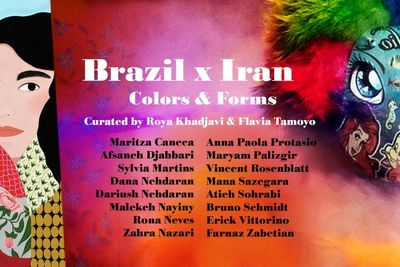Works by Maritza Caneea, Afsaneh Jabbari, Sylvia Martins, Dana Nehdaran, Dariush Nehdaran, Malekeh Naini, Rona Neves, Zahra Nazari, Anna Paola Protasio, Maryam Palizigir, Vincent Rosenblatt, Mana Sazegara, Atieh Sohrabi, Bruno Schmidt, Erick Vittorino and Faranaz Zabetian are on view at the event that opened on February 2.
“With Brazil’s long history of colonialist influences mixing with indigenous patterns and traditions of art and craft making and Iran’s Persian codes and symbols expressed in textiles and fine art, we see patterns emerging from varied cultures, overtaking, underscoring and mixing with the other,” the organizers wrote in a statement for the exhibition, which will be running through February 15.
“Using those codes and patterns as well as interpreting current events and psychological issues stemming from the stress of politics, the pandemic and perennial problems in growing up in our stressful world, Brazilian and Iranian artists creatively use visual media’s international language to connect with each other and the viewer,” they said.
Khadjavi is an independent curator and cultural producer based in New York. She has largely focused on the work of young Iranian artists working both in Iran and beyond its borders, seeking not only to support their artistic endeavors but to also facilitate awareness and cultural dialogue between artistic communities.
Since 2008, she has actively coordinated exhibitions by artists from the Middle East for institutions, including the Guggenheim Museum and the Asia Society, where she sat on the steering committee of the critically acclaimed exhibit, Iran Modern.
“Brazil and Iran have a long history of mixing with influences from the outside,” Khadjavi has said.
“Iran, despite numerous invasions by foreign powers throughout its history, has a deeply rooted ancient culture and has been able to maintain her rich heritage and identity which affects her art to this day,” she added.
“Similarly, Brazil’s various ethnic groups, a large indigenous population, a strong native culture, the Portuguese invasion, which resulted in 600 hundred years of colonialism, and Western culture have also created a rich history abundant in diversity and color from which her contemporary artists can’t escape,” she noted.
Source:Tehran Times

